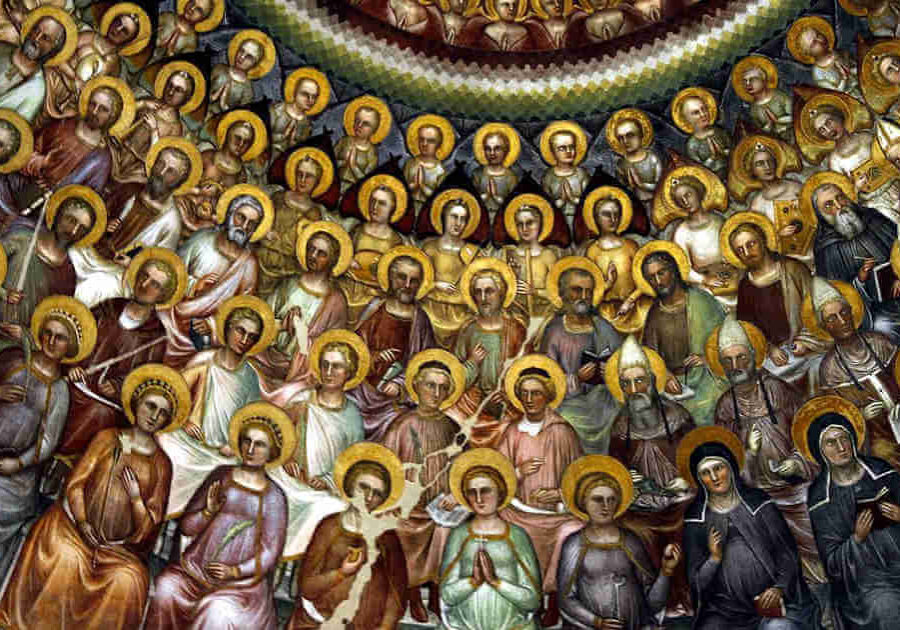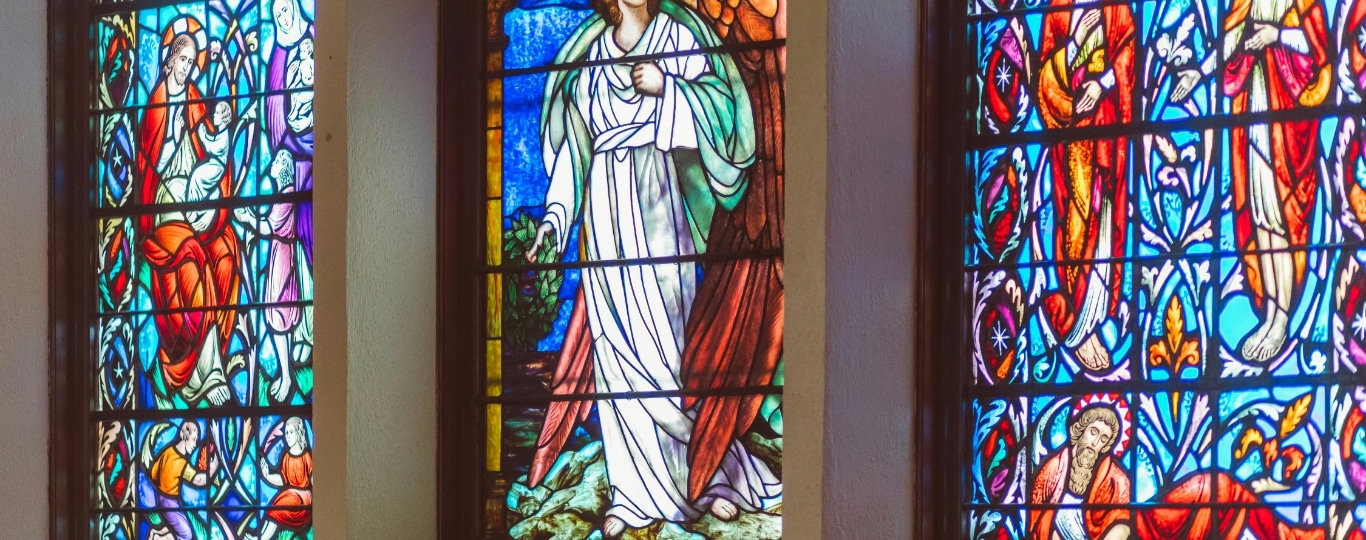†
“Show me Your ways, O Lord; teach me Your paths. Lead me in Your truth and teach me, for You are the GOD of my salvation; on You, I wait all the long day” (Psalm 25.4-5).
St. Mark’s here is a hard saying: “I say to you that likewise there will be more joy in heaven over one sinner who repents than over ninety-nine just persons who need no repentance” (St. Luke 15.7). — Why is this a hard saying? Because we are the ninety and nine, and we, as King David has written, we are being led by the LORD, meekly and mildly on the merciful and narrow ‘paths of the LORD, for we keep His covenant and His testimonies.” (cf. Ps. 25.10) — I mean we are here in church this morning, unlike the ‘one’. And chances are, based upon human nature that still animates the Christian experience, we are likely to be annoyed when confronted with the ‘one’ who has wandered off and not here with us today. And as such, we will not appreciate when he has been returned to the sheepfold with the rest of us, after the Good Shepherd finds him and brings him here. The rejoicing in Heaven, according to the LORD JESUS, is not for the ninety and nine but for the one sinner returned unto his Master after being lost. And if we are not careful, like the Pharisees and scribes, we will miss out on the festivities when the ‘one’, returns. — This why it is a hard saying.
C.S. Lewis is purported to have had a vision – a dream – captured on paper, which he called, The Great Divorce. In his dream, Lewis sees two characters in Heaven: a large Ghost come from Hell, and a solid person in a white robe, an angel. The Ghost arrives in a bus, and upon departure from his heavenly transport, the angel meets him and begins a dialogue. Lewis narrates the scene as follows, beginning with the angel saying: “‘Don’t you know me?’ he shouted to the Ghost, and I, Lewis, could not help but turn and look at them. The face of the solid spirit — he was one of those that wore a white robe — it made me want to dance; it was so jocund; so agreeable; so established in its youthfulness. ‘Well, I’m a fool,’ said the Ghost. ‘I wouldn’t have believed it. It’s a punch in the gut! If it isn’t Len. What about poor Jack, eh? You look pretty pleased with yourself, but what I say is, what about poor Jack?’ ‘He is here,’ said the angel. ‘You will meet him soon, if you stay.’ ‘But you murdered him.’ ‘Of course I did. It is alright now.’ — ‘All right, is it? All right for you, you mean. ‘But what about the poor chap Jack, laying cold and dead?’ — ‘But he isn’t. I have told you; you will meet him soon. He sends you, his love.’ — ‘What I’d like to understand,’ said the Ghost, ‘is what you’re doing here, as pleased as punch, you, a bloody murderer, while I’ve been walking the streets down there in hell and living in a place like a pigsty all these years.’ — ‘That is a little hard to understand at first. But it is all over now’, said the angel. ‘You will be pleased about it presently. Till then there is no need to bother about it.’”1
The Ghost that had come on a daytrip from hell, in C.S. Lewis’ vision, was flummoxed at the sight of a murderer in Heaven; (a murderer of a common acquaintance to both of these souls, mind you). His vision of what Heaven was, and who the GOD of Heaven is, inhibited him from seeing the opportunity that lay before him. The Ghost had the opportunity to travel to the Great Mountain and become solid himself. Yet, because he had created in his mind a popular notion of what Heaven is like, and who will be there, he was inhibited by the past. Even more unfortunately, he had created in his heart an idea of who he presumed GOD to be; viz., One who does not dine with sinners and tax-collectors. — He was mistaken! Equally mistaken are the Pharisees and scribes in today’s Gospel Lesson, and they are to be pitied. Due to their limited vision of what the Kingdom of GOD is like, they would not join in the rejoicing over even one sinner in Israel that came unto repentance.
In today’s Gospel lesson, the Pharisees and scribes were appalled in their hearts to see JESUS receiving and dining with sinners and tax-collectors. — It is hard to quantify the degree of disgust the so-called righteous Jews in the religious class had for their fellow Jews who practiced sin and did not keep the Law: moral, civil, and religious. — I suppose the only way to communicate their disgust, is to consider how much GOD in Christ JESUS showed loved for them. These would be the complete and perfect polar opposite views, each helping to describe the other in its contrast. — Certainly, these were people who were regarded by the self-appointed [religious] experts, as hopelessly irreligious, and out of touch with the demands that GOD had made on Israel through the law. Further, they would be considered abominable company for any self-respecting son of Abraham, especially someone who claimed to be a rabbi, as JESUS did. To help them refine their religious worldview, JESUS tells them a parable.
The brilliance of JESUS’ use of parables to make His point and to teach a divine truth, cannot be underappreciated. JESUS’ “parables bear reference to well-known scenes, such as those of daily life; or to events, either real, or such as everyone would expect in a given circumstance … Such pictures, to a common mind, are in JESUS’ parables, connected with spiritual realities. Yet, JESUS’ parables are distinguished from a mere spiritual illustration. An illustration conveys not more than – perhaps not so much as – that which was to be illustrated; while the parable conveys this and a great deal beyond to those, who can follow up its spiritual shadows of truth to the Light by which those shaadows have been cast.”2 Further, they force us, as they did to the people in JESUS’ day, to be introspective, and to examine our own hearts in light of the spiritual truth those divine Parables are communicating. And in this case, JESUS is going to ask us to look inward at our own hearts, and prove them for any biases and prejudices we might have, if we cannot, like the Ghost, or the religious elite, imagine a Heaven full of people known on earth as sinners, tax-collectors, abusers, drunkards, drug-addicts, licentious men and women, and the like. — JESUS wants us to even see the preposterous and beautiful reality of those folks sitting with us, the ninety and nine, and JESUS, sharing in the Wedding Feast of the Lamb on the Last Day.
Thus, JESUS tells the eminent experts in GOD’s law, who thought they knew what GOD’s Kingdom should look like, and who GOD should be fellowshipping with, three parables; only two of which we have heard today. — All of these parables have the same theological meaning: GOD saves humanity from his lostness and sin, for GOD’s sake, not for the sake of those who are lost. — I know this might sound different from what we normally think about when we study these passages, but it is hard to make the argument that we are worthy, in and of ourselves for salvation. In fact, it is hard to think of anything pitiable about us that would endear us to GOD. As the prophet Isaiah sayeth: “But we are all as an unclean thing, and all of our righteousness is as filthy rags [before GOD]” (Isaiah 64.6).
Thus, we must conclude that GOD saves humanity for Himself. It is His salvation after all, and all of us, the Bible teaches, have fallen from the Grace that might otherwise have proved our worthiness. — GOD saves us to be His own people, zealous, willing, eager, and desirous to do good works in this world that glorify Him, His Name, His Word, and His Kingdom. — We know this because of the detail and purpose of the parables that JESUS tells the religious leaders, offended at the company He kept.
The first parable is a favorite in all of Christendom, and the second, memorable, but perhaps less appreciated. — In the first parable, JESUS tells a story about a lost sheep. — Nothing strange there, for in their very nature, sheep are prone to lostness. If they were not, they would not need a shepherd. — People too, are prone to lostness. We have inherited, in our spiritual nature, a proneness to wander off from home, just like our first parents, Adam and Eve. — As St. Paul taught the Roman church: “Therefore … sin came into the world through one man, and death through sin, and so death spread to all men because all sinned” (Romans 5.12 – ESV). — Let’s face it. Without the Great Shepherd, JESUS, “we are lost – a designation that reflects a profound perspective on our true identity. Like sheep, people wander off and lose their way. They need to be rescued and returned to the flock where they belong.”3 Yet, this is only partially JESUS’ point. ‘Why’ they are rescued, that is the greater theological lesson JESUS’ parables communicate.
The thought-provoking component of this parable is not the single lost sheep, nor even the ninety-and nine sheep that are not lost. Rather, the provocative nature of JESUS’ parable lies in the fact that the shepherd would go looking for the single sheep lost sheep in the first place. That he is not content with just the ninety and nine that will probably produce another ten sheep in a few days. Now this is what should stir us from our spiritual stupors. For some reason, unless his flock is complete – one being lost – the Shepherd cannot rest nor be fulfilled.
In a book called The Good Shepherd, Tim Laniak presents pastoral narratives of shepherds in the Middle East who have at one time, lost sheep. — In one story, a shepherdess had lost a particular ewe from her flock. She thought the ewe had become separated through the intermixing of flocks that was typical in Jordan. After much searching, not a local, nor neighboring shepherd had seen the lost sheep. Then, one day, when a visiting herd was passing through the area with a hired shepherd, the woman asked him, as was her custom, if he had seen a strange ewe in and among his flock. “As the words passed her lips, one of the ewes in the solid pack of passing sheep lifted her head, immediately recognizing the sound of the shepherdess’ voice. The shepherdess rushed through the startled mass of animals to embrace her lost sheep. It did not take long for her whole village to hear about the news and to join the shepherdess in her rejoicing. Her flock was now complete again.”4
This is the message that JESUS wants the hearers of His parables in St. Luke 15 to understand. The Good Shepherd seeks and saves that which was lost, for that is His nature. — No matter what they have done to become lost, where they have been, or in what sort of ‘muck’ they have been involved in while lost, the Good Shepherd does not want to lose even 1% of His flock – no, not even one of them.– The Pharisees and scribes were challenged by their self-righteous vision of GOD and His Kingdom, to see how GOD could care for sinners – imperfect people, if you will. Yet, JESUS stressed that like the shepherdess and her village, the same rejoicing transpires in Heaven when GOD sees one sinner come to repentance. — The Pharisees and scribes were hard-pressed to comprehend this, so, JESUS tried again.
This time, JESUS told a parable about a woman who had lost one of her ten silver coins. The story shows how the woman, not the coin, is in the predicament. She will not rest until her coin can be returned. Thus, she lights a lamp and sweeps out the house. It is she who is deserving to locate her lost one, not the coin. Her fulfillment and completeness are unsatisfied until she finds what has been lost to her. — If we can follow up the shadows to the light of the truth by which this story is cast, then we will see our deserving GOD; deserving to find, as evidenced in the seeking and saving, what belongs uniquely to Him. — For the only thing unique about the one lost lamb and coin, is that they are lost to their Master, and He will rest not, until He finds them.
And once He finds that which was lost to Him, as JESUS’ Parable showcases, the joy of Heaven rejoices with Him for the rediscovery and renewal of these to their Master. — Now, the danger which we must avoid, and which JESUS was trying to warn the Pharisees and scribes about, is thinking that these lost ones do not deserve to be found because they are evil, reprehensible, and unworthy. Instead, JESUS is teaching that GOD deserves to get back that which He has lost because it belongs to Him – He created it. GOD deserves to find that which was lost to Him; not because that which is lost is somehow better than those things that are not lost. Rather, the ‘one’ deserves to be found because GOD is special – His love is special – everything He creates is special, especially those created in His own image. These, He deserves to find and redeem unto Himself.
And when the ‘one’ is found, we should rejoice with GOD over its redemption, no matter our biases and prejudices towards that ‘one’. This was GOD’s intent from the beginning – especially since His Son shed His blood upon the Cross to redeem the whole world. — The Pharisees and scribes missed this point. JESUS was trying to show them how GOD rejoices in Heaven with His angels, not so much over the perfect Temple or Sunday morning worship of the ninety and nine, as He does when one of these sinners comes unto repentance his lostness. When that which belongs to Him is found.
The Salvation of GOD is not for the deserving, for none of us deserves it. The Salvation of GOD is for GOD; He deserves it! — Dear brothers and sisters of St. Mark’s, the Spirit of Christ never looks for vengeance upon some undeserving man or woman because of their sin; the Spirit of Christ searches the world over, looking to minister GOD’s reconciliation, because GOD deserves to find and save that which was lost.
So, the large Ghost says to the angel with white robes in C.S. Lewis’ vision: “‘No need to bother about it? Aren’t you ashamed of yourself?’ ‘No. Not as you mean, said the solid one. I do not look at myself. I have given up myself. I had to, you know, after the murder. That was what it did for me. And that was how everything began.’ ‘Personally,’ said large Ghost with an emphasis which contradicted the ordinary meaning of the word, ‘personally, I’d have thought you and I ought to be the other way round. That’s my personal opinion … And what I don’t see is why I should be put below a bloody murderer like you. It’s not my rights.’ ‘Oh no. It’s not so bad as that’, said the solid one. ‘I haven’t got my rights, or I should not be here either. You will not get your rights either. You’ll get something far better. Never fear.’”5 You will get what you do not deserve: to be found.
This is a hard saying: “There is joy in the presence of the angels of GOD over one sinner who repents,” (St. Luke 15.10) Amen.
1 Lewis, C.S., Five Best Books in One Volume: Excerpts from ‘The Great Divorce”, (Grand Rapids: Baker Book House, 1969), 129-130.
2 Edersheim, Rev’d Alfred, The Life and Times of Jesus the Messiah, (London, Longmans, Greens and Co., 1904), 401.
3 Laniak, Tim, The Good Shepherd: Biblical Insights on Leading and Being Led, (Grand Rapids: Zondervan, 2024), 79.
4 Laniak, 78.
5 Lewis, 130.
Join Us for Biblical Worship, Study, & Fellowship
Sundays:
Morning Prayer 9:45 am
Coffee & Catechesis 10:30 am
Holy Communion 12:00 pm
Thursdays:
Holy Communion 6:00 pm



